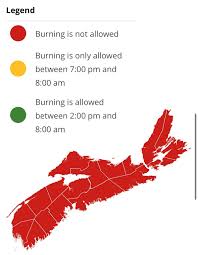
Importance of the Burn Ban in Nova Scotia
As the summer months roll in and the risk of wildfires increases, Nova Scotia has implemented a burn ban across the province. This crucial measure is designed to protect both residents and wildlife from the devastating impacts of uncontrolled fires. With the rise in temperatures and dry conditions, understanding the significance of this ban is essential for the safety of communities.
Current Situation and Measures Taken
As of late June 2023, the Nova Scotia Department of Natural Resources and Renewables has enforced a total burn ban following a series of dry weeks, which heightened the risk of wildfires. The ban prohibits open burning, including campfires, bonfires, and any form of outdoor burning. The department stated that these regulations may remain in effect until significant rainfall is observed, which is necessary to mitigate fire risks.
Firefighters across the province have encountered several small wildfires already this season, and officials are concerned that warmer weather could exacerbate the situation. The ongoing burn ban serves to reduce activities that could lead to accidental fires, ensuring that emergency services are available to respond to any incidents effectively.
Public Awareness and Compliance
The provincial government is urging residents to stay informed about the burn ban as well as its potential extensions. Through public service announcements, social media campaigns, and local news updates, officials are highlighting the importance of adhering to the ban. Violators can face hefty fines or even criminal charges, emphasizing the need for compliance.
Local municipalities are playing a pivotal role in disseminating information about the ban to ensure that everyone understands its implications. Many communities are also encouraging alternative activities such as indoor gatherings or using designated public barbecue areas in compliance with safety regulations.
Conclusion: The Significance of Fire Safety
As Nova Scotia continues to face challenges posed by heat and dryness, the burn ban serves as a critical reminder of the importance of fire safety. Residents are encouraged to take the ban seriously, as the consequences of non-compliance could lead not only to severe legal repercussions but also to the loss of property and wildlife. Looking forward, the Department of Natural Resources will monitor conditions closely, and any updates regarding the status of the burn ban will be communicated promptly. Staying informed and adjusted to regulations is essential for community safety during this critical period.



